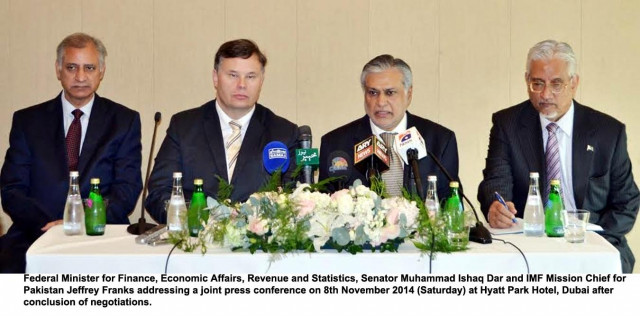Conceding Islamabad’s demand: IMF agrees to scale down tax target by Rs119b
Lender’s mission chief approves the next tranche of $6.6b loan

IMF mission chief Jeffrey Franks (L) and Finance Minister Ishaq Dar (R) during a press conference on Saturday. PHOTO: PID
The International Monetary Fund (IMF) has conceded to Pakistan’s demand for a downward revision of this fiscal year’s tax collection target by Rs119 billion, as both sides announced the agreement on the next $518 million tranche of the $6.6 billion loan programme.
“The IMF has agreed to reduce FBR’s (Federal Board of Revenue) tax collection target to Rs2.691 trillion against the original target of Rs2.81 trillion,” Finance Minister Ishaq Dar told a news conference in Dubai on Thursday as he and IMF Mission Chief for Pakistan Jeffrey Franks announced the successful conclusion of the sixth review of Pakistan’s economy.
It was not immediately clear whether the government will cut the Public Sector Development Programme (PSDP) by the same amount or if the budget deficit ceiling of 4.9% of Gross Domestic Product (GDP) has been relaxed.

Talks between Islamabad and the IMF for the next loan tranche concluded successfully despite the government’s failure to introduce energy and tax reforms, and give autonomy to the State Bank of Pakistan (SBP).
Talking to reporters, Dar claimed FBR’s performance in collecting revenue was marred by the reduction in the prices of petroleum products.
However, his assertion appeared less than convincing as the government had claimed that it would sustain a Rs68 billion shortfall in revenues and would be able to recover Rs28 billion out of this amount after increasing sales tax on all petroleum products. The government has raised the sales tax rate on petroleum products to 27% from the standard rate of 17%.
Since the beginning of the current fiscal year, independent economists have criticised the government for setting an unrealistic tax collection target of Rs2.81 trillion. FBR officials and economists remain skeptical about the tax machinery’s ability to collect even the lowered target of Rs2.691 trillion.
Both the IMF and Pakistan government have agreed on steps to boost FBR’s revenue collection going forward, said Jeffrey Franks. He did not explain whether this would mean levying more taxes.
Franks too said measures to reduce tax loopholes were bearing fruit but FBR’s revenue collection was hit by lower oil revenues and lower inflation. He said FBR needed more efforts to boost its declining revenue. The IMF mission chief added that FBR had also missed the indicative collection target of Rs1.195 trillion for the first half of the fiscal year.
Dar, however, claimed that the government had met all performance criteria, indicative targets and structural benchmarks.
Franks said there was overall improvement in Pakistan’s economy but emphasised that efforts should be made towards building up foreign exchange
However, according to ex-IMF official and former deputy chairman of the Planning Commission Dr Nadeemul Haque, real and meaningful reforms were never part of the IMF bailout programme.
Dar said the successful completion of negotiations will enable IMF to go to their board for the release of the seventh $518 million tranche. He claimed that completion of the sixth review was indicative of the government’s commitment to implementing structural reforms in taxation, energy, monetary and financial sectors and public sector enterprises.
Dar said low oil prices
Published in The Express Tribune, February 6th, 2015.






1724319076-0/Untitled-design-(5)1724319076-0-208x130.webp)












COMMENTS
Comments are moderated and generally will be posted if they are on-topic and not abusive.
For more information, please see our Comments FAQ